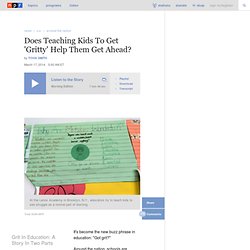

Start here! The Psychological Dimension of Stories. Take in the Good - Rick Hanson at Chicago Ideas Week. ReducingStereotypeThreat.org. Does Teaching Kids To Get 'Gritty' Help Them Get Ahead? Hide captionAt the Lenox Academy in Brooklyn, N.Y., educators try to teach kids to see struggle as a normal part of learning.

Tovia Smith/NPR At the Lenox Academy in Brooklyn, N.Y., educators try to teach kids to see struggle as a normal part of learning. Tovia Smith reported this audio story in two parts on Morning Edition and All Things Considered. To hear Part One, click 'Listen To The Story' above. For Part Two, 'Lessons In Grit,' click the link below. It's become the new buzz phrase in education: "Got grit? " Around the nation, schools are beginning to see grit as key to students' success — and just as important to teach as reading and math. Conversation: Jonathan Gottschall, Author of 'The Storytelling Animal' Now this is a story all about how… we tell stories.

Whether it’s the Fresh Prince’s fights on a Philadelphia playground or Odysseus’ struggles at sea, stories have always captivated our attention, and narrative plays a central role in what makes us human. In his new book, “The Storytelling Animal,” Jonathan Gottschall explores the art of telling tales and the science behind what’s at work in our minds when we hear things like, “Once upon a time.” Narrative in the Humanities. Nussbaum. Alain de Botton: How Proust Can Change Your Life. Does the News Do Us Any Good? Telling Your Own Story. Philosopher Martha Nussbaum on How to Live with Our Human Fragility. By Maria Popova “To be a good human being is to have a kind of openness to the world, an ability to trust uncertain things beyond your own control.”

In 1988, Bill Moyers produced a series of intelligent, inspiring, provocative conversations with a diverse set of cultural icons, ranging from Isaac Asimov to Noam Chomsky to Chinua Achebe. It was unlike any public discourse to have ever graced the national television airwaves before. The following year, the interviews were transcribed and collected in the magnificent tome Bill Moyers: A World of Ideas (public library). Brené Brown: The power of vulnerability. Teaching with Heart and Soul. By Parker J.

Palmer Those lines (not least, the feisty assertion that “Porter took his failure very well…”), speak deeply to me about the theme of this issue: teaching in ways “that enhance the human condition and advance social justice.” Those lines fill me with gratitude for all the Mr. Porter-like teachers who serve in American classrooms today. And they make me wonder how we can educate even more teachers of the sort Mr. II. As James Baldwin tells it, the story of Mr. That definition does not solve the complex problems associated with the spiritual impulse: people can and do get connected with things that are death-dealing rather than life-giving, as witness the Third Reich. Mr. A spiritual crisis arises when we find ourselves in the grip of something larger than society’s expectations or the ego’s needs—something like Mr.
How?